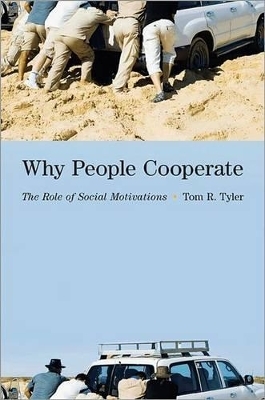
Why People Cooperate
The Role of Social Motivations
Seiten
2013
Princeton University Press (Verlag)
978-0-691-15800-6 (ISBN)
Princeton University Press (Verlag)
978-0-691-15800-6 (ISBN)
Any organization's success depends upon the voluntary cooperation of its members. But what motivates people to cooperate? In Why People Cooperate, Tom Tyler challenges the decades-old notion that individuals within groups are primarily motivated by their self-interest. Instead, he demonstrates that human behaviors are influenced by shared attitudes, values, and identities that reflect social connections rather than material interests. Tyler examines employee cooperation in work organizations, resident cooperation with legal authorities responsible for social order in neighborhoods, and citizen cooperation with governmental authorities in political communities. He demonstrates that the main factors for achieving cooperation are socially driven, rather than instrumentally based on incentives or sanctions. Because of this, social motivations are critical when authorities attempt to secure voluntary cooperation from group members.
Tyler also explains that two related aspects of group practices--the use of fair procedures when exercising authority and the belief by group members that authorities are benevolent and sincere--are crucial to the development of the attitudes, values, and identities that underlie cooperation. With widespread implications for the management of organizations, community regulation, and governance, Why People Cooperate illustrates the vital role that voluntary cooperation plays in the long-standing viability of groups.
Tyler also explains that two related aspects of group practices--the use of fair procedures when exercising authority and the belief by group members that authorities are benevolent and sincere--are crucial to the development of the attitudes, values, and identities that underlie cooperation. With widespread implications for the management of organizations, community regulation, and governance, Why People Cooperate illustrates the vital role that voluntary cooperation plays in the long-standing viability of groups.
Tom R. Tyler is the Macklin Fleming Professor of Law and Professor of Psychology at Yale Law School.
List of Illustrations vii Acknowledgments ix Overview 1 Section One: Introduction 9 CHAPTER ONE: Why Do People Cooperate? 11 CHAPTER TWO: Motivational Models 27 Section Two: Empirical Findings 49 CHAPTER THREE: Cooperation with Managerial Authorities in Work Settings 51 CHAPTER FOUR: Cooperation with Legal Authorities in Local Communities 66 CHAPTER FIVE: Cooperation with Political Authorities 81 Section Three: Implications 91 CHAPTER SIX: The Psychology of Cooperation 93 CHAPTER SEVEN: Implications 108 CHAPTER EIGHT: Self-regulation as a General Model 146 Conclusion 167 Notes 169 References 187 Index 209
| Zusatzinfo | 3 line illus. 14 tables. |
|---|---|
| Verlagsort | New Jersey |
| Sprache | englisch |
| Maße | 152 x 235 mm |
| Gewicht | 340 g |
| Themenwelt | Geisteswissenschaften ► Psychologie ► Arbeits- und Organisationspsychologie |
| Geisteswissenschaften ► Psychologie ► Sozialpsychologie | |
| Sozialwissenschaften ► Soziologie | |
| ISBN-10 | 0-691-15800-2 / 0691158002 |
| ISBN-13 | 978-0-691-15800-6 / 9780691158006 |
| Zustand | Neuware |
| Informationen gemäß Produktsicherheitsverordnung (GPSR) | |
| Haben Sie eine Frage zum Produkt? |
Mehr entdecken
aus dem Bereich
aus dem Bereich
neue Beschäftigte erfolgreich integrieren
Buch | Softcover (2024)
Hogrefe (Verlag)
CHF 36,90
wirksamer führen durch mehr Menschlichkeit
Buch | Softcover (2024)
Vahlen (Verlag)
CHF 30,65


